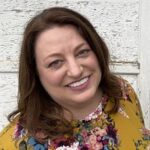Volume 35 Number 5 | October 2021
Kim Von Ahsen, MHA, MLS(ASCP)CM, SLS(ASCP)CM, ASCLS President-Elect

We closed the meeting with Dr. Leonard Egede discussing the historical basis of health disparities and the impact of social determinants on health and health outcomes—a point that ASCLS Past President Cindy Johnson reflected on during her remarks at the House of Delegates.
Building upon ASCLS’ commitment to diversity, equity, and inclusion, the Diversity Advocacy Council held PRISM: Pride · Respect · Inclusion · Support · Momentum—a week-long event in January 2021 that provided members the opportunity to have conversations that can be uncomfortable while being educational, thought-provoking, and inspiring.
“I do believe with my leadership and your willingness, we can continue to make progress in identifying bias, removing barriers, and ensuring a professional Society where our current and future members see themselves in all areas and levels of ASCLS.”
During the PRISM book discussion on Caste, the caste system was described using metaphors such as the bones inside a body, the beams inside a house, and even the computer program from the movie, The Matrix. The commonality of the metaphors are invisible systems that maintain the status quo—bones give stability, beams provide structure, and a computer program that is unseen but holds tight to power. Caste serves to maintain an elevation of one group at the detriment of another.
Through this pandemic, we, as healthcare professionals, have witnessed the harmful impact of caste along socioeconomic and racial lines through the lack of national laboratory testing strategies, inadequate PPE supply and allocation, and inequitable vaccine distribution.
All these events over the last year have positioned ASCLS to have an open and earnest discussion about unconscious bias within us. Awareness begins with the acknowledgment that unconscious bias exists, and biases are part of human nature. Our brains are designed to make quick decisions. Quick decisions along with our experiences create preferences. Ultimately, these preferences influence how we, as leaders and members of ASCLS, make decisions that impact us and our profession.
To lead ASCLS in the dismantling of unconscious bias, the process begins with me. It requires that I am willing to be aware of and acknowledge my own bias. I must be comfortable with and encourage that my biases are questioned, and that I ask you to guide me in the right direction if I make a mistake.
COVID created nostalgia for the “good ole days.” The power of selective nostalgia creates unconscious bias that longs to restore the past rather than reflect on and look to the future. Appreciation of the history and foundation upon which our organization was formed can be achieved while transforming ASCLS to be relevant and valued by the next generation of laboratory professionals. To achieve the mission of ASCLS, we must remove the barriers we have created through our unconscious bias.
Efforts by the Board of Directors over the last year to remove barriers in ASCLS are evident in mindful policy changes and strategic focus. Efforts such as:
- Charging the Nominations Committee to consider an expanded range of criteria when recruiting the slate for elections. Attaining a Board of Directors which is truly representative of the membership.
- Utilizing technology that allows virtual participation in the Annual and Mid-Year House of Delegates Meetings. Providing access for members previously unable to participate and expanding representation to include broader viewpoints in decision-making that impacts our members.
- Transparent discussions on balanced board versus geography-driven governance. Encouraging a leadership model that recruits volunteers based upon talent and diverse perspectives.
- Continued support of and commitment to the Diversity Advocacy Council. Ensuring we are true to our ASCLS Definition of Diversity.
The answer to tackle unconscious bias within ASCLS is not simple, and I readily admit that I am not an expert. However, I do believe with my leadership and your willingness, we can continue to make progress in identifying bias, removing barriers, and ensuring a professional Society where our current and future members see themselves in all areas and levels of ASCLS.
Thank you for entrusting me with the responsibility and honor of leading ASCLS. Together, we can be a powerful force of change. Together, we can imagine and create the ASCLS of the future.
Kim Von Ahsen is Manager of Client Services for UnityPoint Health – Des Moines Clinical Laboratories in Des Moines, Iowa.